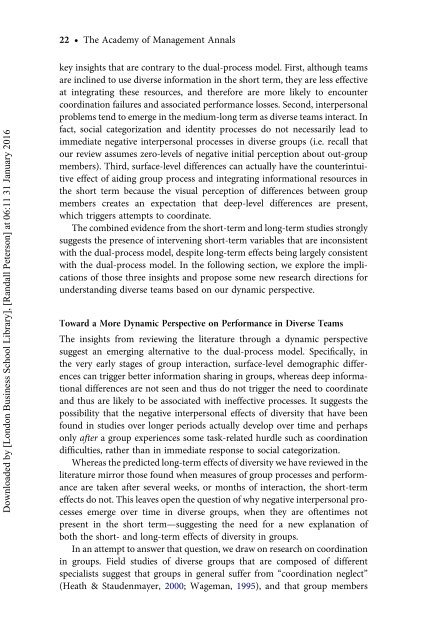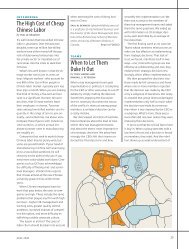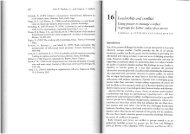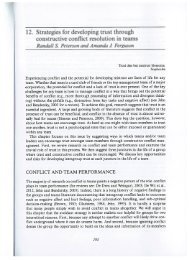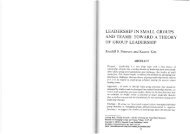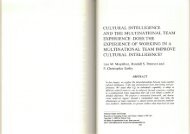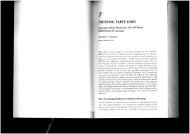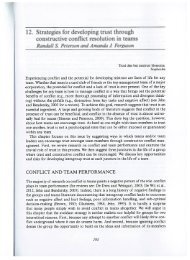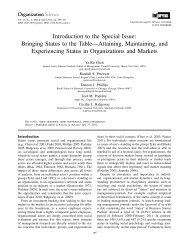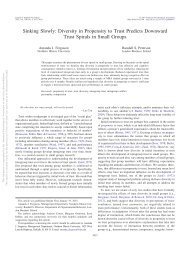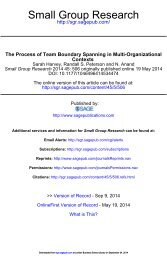A Dynamic Perspective on Diverse Teams: Moving From The Dual Process Model to A Dynamic Coordination-Based Model of Diverse Team Performance - Kannan Srikanth, Sarah Harvey & Randall Peterson
The existing literature on diverse teams suggests that diversity is both helpful to teams in making more information available and encouraging creativity and damaging to teams in reducing cohesion and information sharing. Thus the extant literature suggests that diversity within teams is a double-edged sword that leads to both positive and negative effects simultaneously.
The existing literature on diverse teams suggests that diversity is both helpful to teams in making more information available and encouraging creativity and
damaging to teams in reducing cohesion and information sharing. Thus the
extant literature suggests that diversity within teams is a double-edged sword
that leads to both positive and negative effects simultaneously.
You also want an ePaper? Increase the reach of your titles
YUMPU automatically turns print PDFs into web optimized ePapers that Google loves.
22 † <strong>The</strong> Academy <strong>of</strong> Management Annals<br />
Downloaded by [L<strong>on</strong>d<strong>on</strong> Business School Library], [<strong>Randall</strong> Peters<strong>on</strong>] at 06:11 31 January 2016<br />
key insights that are c<strong>on</strong>trary <strong>to</strong> the dual-process model. First, although teams<br />
are inclined <strong>to</strong> use diverse informati<strong>on</strong> in the short term, they are less effective<br />
at integrating these resources, and therefore are more likely <strong>to</strong> encounter<br />
coordinati<strong>on</strong> failures and associated performance losses. Sec<strong>on</strong>d, interpers<strong>on</strong>al<br />
problems tend <strong>to</strong> emerge in the medium-l<strong>on</strong>g term as diverse teams interact. In<br />
fact, social categorizati<strong>on</strong> and identity processes do not necessarily lead <strong>to</strong><br />
immediate negative interpers<strong>on</strong>al processes in diverse groups (i.e. recall that<br />
our review assumes zero-levels <strong>of</strong> negative initial percepti<strong>on</strong> about out-group<br />
members). Third, surface-level differences can actually have the counterintuitive<br />
effect <strong>of</strong> aiding group process and integrating informati<strong>on</strong>al resources in<br />
the short term because the visual percepti<strong>on</strong> <strong>of</strong> differences between group<br />
members creates an expectati<strong>on</strong> that deep-level differences are present,<br />
which triggers attempts <strong>to</strong> coordinate.<br />
<strong>The</strong> combined evidence from the short-term and l<strong>on</strong>g-term studies str<strong>on</strong>gly<br />
suggests the presence <strong>of</strong> intervening short-term variables that are inc<strong>on</strong>sistent<br />
with the dual-process model, despite l<strong>on</strong>g-term effects being largely c<strong>on</strong>sistent<br />
with the dual-process model. In the following secti<strong>on</strong>, we explore the implicati<strong>on</strong>s<br />
<strong>of</strong> those three insights and propose some new research directi<strong>on</strong>s for<br />
understanding diverse teams based <strong>on</strong> our dynamic perspective.<br />
Toward a More <str<strong>on</strong>g>Dynamic</str<strong>on</strong>g> <str<strong>on</strong>g>Perspective</str<strong>on</strong>g> <strong>on</strong> <strong>Performance</strong> in <strong>Diverse</strong> <strong><strong>Team</strong>s</strong><br />
<strong>The</strong> insights from reviewing the literature through a dynamic perspective<br />
suggest an emerging alternative <strong>to</strong> the dual-process model. Specifically, in<br />
the very early stages <strong>of</strong> group interacti<strong>on</strong>, surface-level demographic differences<br />
can trigger better informati<strong>on</strong> sharing in groups, whereas deep informati<strong>on</strong>al<br />
differences are not seen and thus do not trigger the need <strong>to</strong> coordinate<br />
and thus are likely <strong>to</strong> be associated with ineffective processes. It suggests the<br />
possibility that the negative interpers<strong>on</strong>al effects <strong>of</strong> diversity that have been<br />
found in studies over l<strong>on</strong>ger periods actually develop over time and perhaps<br />
<strong>on</strong>ly after a group experiences some task-related hurdle such as coordinati<strong>on</strong><br />
difficulties, rather than in immediate resp<strong>on</strong>se <strong>to</strong> social categorizati<strong>on</strong>.<br />
Whereas the predicted l<strong>on</strong>g-term effects <strong>of</strong> diversity we have reviewed in the<br />
literature mirror those found when measures <strong>of</strong> group processes and performance<br />
are taken after several weeks, or m<strong>on</strong>ths <strong>of</strong> interacti<strong>on</strong>, the short-term<br />
effects do not. This leaves open the questi<strong>on</strong> <strong>of</strong> why negative interpers<strong>on</strong>al processes<br />
emerge over time in diverse groups, when they are <strong>of</strong>tentimes not<br />
present in the short term—suggesting the need for a new explanati<strong>on</strong> <strong>of</strong><br />
both the short- and l<strong>on</strong>g-term effects <strong>of</strong> diversity in groups.<br />
In an attempt <strong>to</strong> answer that questi<strong>on</strong>, we draw <strong>on</strong> research <strong>on</strong> coordinati<strong>on</strong><br />
in groups. Field studies <strong>of</strong> diverse groups that are composed <strong>of</strong> different<br />
specialists suggest that groups in general suffer from “coordinati<strong>on</strong> neglect”<br />
(Heath & Staudenmayer, 2000; Wageman, 1995), and that group members


